I have strange behavior of the static final values in my interface:
public interface IDictionaryErrorTypes {
final static int ERROR_UNKNOWN = 0;
final static int ERROR_XML = 1;
final static int ERROR_CONNECTION = 3;
}
public interface IDictionaryListModel extends IDictionaryErrorTypes,
//... and other interfaces
{
}
public class DictionaryListModel implements IDictionaryListModel {
// ... some code ...
private int getErrorCode(Exception error) {
// determinate the error code
if (error instanceof ParserConfigurationException
|| error instanceof SAXException
|| error instanceof SAXParseException) {
return ERROR_XML;
} else if (error instanceof UnknownHostException
|| error instanceof MalformedURLException
|| error instanceof IOException) {
return ERROR_CONNECTION;
}
return ERROR_UNKNOWN;
}
And now when I run the application ERROR_XML, ERROR_CONNECTION and ERROR_UNKNOWN values equals ZERO - 0. It seems to me very strange. Please look at attached image

If I use in my model IDictionaryErrorTypes.ERROR_CONNECTION it still has the same behavior. But if I remove the "implements IDictionaryErrorTypes" and then use IDictionaryErrorTypes.ERROR_CONNECTION it works - constant values are exactly as they sound be.
When I use class instead of interface it also works fine.
Can someone explain this behavior? (p.s. Im using android platform)
p.s.(2) I also experimented by adding/removing "final", "static", "public" keywords ( That is why interface declaration in the image and code about a little bit differ). But behavior is the same
smali code of the WORKING VERSION (using class instead of interface):
.method private getErrorCode(Ljava/lang/Exception;)I
.registers 3
.parameter "error"
.prologue
.line 145
instance-of v0, p1, Ljavax/xml/parsers/ParserConfigurationException;
if-nez v0, :cond_c
.line 146
instance-of v0, p1, Lorg/xml/sax/SAXException;
if-nez v0, :cond_c
.line 147
instance-of v0, p1, Lorg/xml/sax/SAXParseException;
if-eqz v0, :cond_e
.line 148
:cond_c
const/4 v0, 0x1
.line 154
:goto_d
return v0
.line 149
:cond_e
instance-of v0, p1, Ljava/net/UnknownHostException;
if-nez v0, :cond_1a
.line 150
instance-of v0, p1, Ljava/net/MalformedURLException;
if-nez v0, :cond_1a
.line 151
instance-of v0, p1, Ljava/io/IOException;
if-eqz v0, :cond_1c
.line 152
:cond_1a
const/4 v0, 0x3
goto :goto_d
.line 154
:cond_1c
const/4 v0, 0x0
goto :goto_d
.end method
// class instead of interface
.class public Ltj/zar/projects/kathtranslator/interfaces/common/IDictionaryErrorTypes;
.super Ljava/lang/Object;
.source "IDictionaryErrorTypes.java"
# static fields
.field public static final ERROR_CONNECTION:I = 0x3
.field public static final ERROR_UNKNOWN:I = 0x0
.field public static final ERROR_XML:I = 0x1
# direct methods
.method public constructor <init>()V
.registers 1
.prologue
.line 3
invoke-direct {p0}, Ljava/lang/Object;-><init>()V
return-void
.end method
smali code of the UNWORKING VERSION:
.method private getErrorCode(Ljava/lang/Exception;)I
.registers 3
.parameter "error"
.prologue
.line 145
instance-of v0, p1, Ljavax/xml/parsers/ParserConfigurationException;
if-nez v0, :cond_c
.line 146
instance-of v0, p1, Lorg/xml/sax/SAXException;
if-nez v0, :cond_c
.line 147
instance-of v0, p1, Lorg/xml/sax/SAXParseException;
if-eqz v0, :cond_e
.line 148
:cond_c
const/4 v0, 0x1
.line 154
:goto_d
return v0
.line 149
:cond_e
instance-of v0, p1, Ljava/net/UnknownHostException;
if-nez v0, :cond_1a
.line 150
instance-of v0, p1, Ljava/net/MalformedURLException;
if-nez v0, :cond_1a
.line 151
instance-of v0, p1, Ljava/io/IOException;
if-eqz v0, :cond_1c
.line 152
:cond_1a
const/4 v0, 0x3
goto :goto_d
.line 154
:cond_1c
const/4 v0, 0x0
goto :goto_d
.end method
// interface
.class public interface abstract Ltj/zar/projects/kathtranslator/interfaces/common/IDictionaryErrorTypes;
.super Ljava/lang/Object;
.source "IDictionaryErrorTypes.java"
# static fields
.field public static final ERROR_CONNECTION:I = 0x3
.field public static final ERROR_UNKNOWN:I = 0x0
.field public static final ERROR_XML:I = 0x1
solve
Ive cleaned up the project, changed emulator to real device and wrote some test.
Results
It seems a debugger problem:
As you can see in the image error is "3" and ERROR_CONNECTION is "0". And device actually runs the next string (green string), that means that debugger thinking that 3 == 0, but actually its 3 == 3
Conclusion
Debugger bug.
